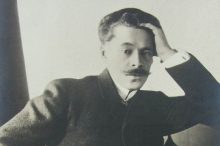A composer but also a piano virtuoso, the teacher of a number of major Russian composers and an outstanding chorus master, Arensky was born in 1861 in Veliky Novgorod into a family of enthusiastic amateur musicians. His father was a doctor but also played the cello and occasionally conducted; his mother, a pianist, gave young Anton piano lessons from a very early age. At nine years of age he was already composing songs and piano pieces. The family’s relocation to St. Petersburg brought further developments. In 1879 he entered that city’s conservatory to study with an eminent member of the Mighty Handful, Nikolai Andreyevich Rimsky-Korsakov, who was to have a great although not permanent influence on him. In the memoirs he wrote later, Rimsky-Korsakov criticised Arensky’s fickleness in choosing his musical models and his insufficient talent, predicting that he would soon be forgotten. In this connection, however, we should also remember that Arensky’s great model was Anton Rubinstein, who, fascinated by Western music, founded the St. Petersburg Conservatory and was no great favourite or enthusiast of the Mighty Handful and their radical shift to traditional Russian music.
After graduating from the St. Petersburg Conservatory in 1882 with special mention and a gold medal, Arensky went off to Moscow, where in its conservatory at the record low age of 21 he became instructor in composition, polyphony and instrumentation. Here he aroused great interest in Tchaikovsky, who became his admirer as well as a source of creative inspiration. In 1889 he was appointed professor at the Moscow Conservatory and became a leading figure in the education of a whole generation of Russian composers including Rachmaninov, Scriabin and Glière.
Already in his years in Moscow, however, Arensky gave evidence of a tendency to unrestrained drinking and gambling. He still managed to meet his obligations and to become a sought-after piano virtuoso. It was in Moscow too that he gained fame as a conductor of symphonic concerts and most of all as the choir master of the Russian Vocal Ensemble.
At the same time he served as member of the board of directors of the Synod School of Church Music, and as a leading specialist in the field of choral music, he received in 1895 a lucrative offer that required his giving up all his activities in Moscow and returning to St. Petersburg. When a year before that, Balakirev had left his position as director of the Imperial Court Choir, the oldest professional ensemble in Russia, founded back in the 15th century, Arensky was the very person he recommended for the post. Arensky did not hesitate long and returned St. Petersburg. During the next six years of his activities as director, it became more than a choir; it was an extensive institution that also included a symphony orchestra, a large concert hall and a general music education establishment.
At the turn or the century in 1901, Arensky gave up his position with a retirement pension of six thousand roubles and again devoted himself exclusively to composing and concertising. In spite of enjoying great success on podiums in Russia and abroad, vodka led to a drastic downturn in his life. He divorced his wife, fell ill with consumption, and during a stay in Nice, instead of improving, his health worsened further. He died in a spa in what was at that still the Finnish part of Karelia in the winter months of 1906.
Today, even more than Arensky’s eminently successful opera Son na Volge (Dream on the Volga) based on Ostrovsky’s drama The Voyevoda, we appreciate his small works for piano and songs. If anything in his works can be said in some way really to have taken a new direction, it would be his tendency to irregular metrics. The finale of his piano concert, for example, has a five-beat rhythm, something for which Tchaikovsky is said to have had a great liking. In his piano Essays on Forgotten Rhythms, op. 28, he further developed his rhythmic and metrical experimentations. Some of his most frequently performed works for ensembles are his Variations on a Theme of Tchaikovsky (from the slow movement of the latter’s String Quartet No. 2) and his Piano Trio No. 1 in D minor albeit its style owes much to a Mendelssohn trio in the same key. Arensky’s music is said to have been much admired by the writer Tolstoy, something quite unusual for him in that he condemned absolutely substantial portions of the musical repertory.
Arensky is buried in a place of honour in the Tikhvinsky Cemetery of the Alexander Nevsky monastery in St. Petersburg. His tombstone is a relief carved out of white stone with the composer at the piano and angel-musicians all around him. Atypically, it has been affixed to the wall of the cemetery chapel. It is within sight of the graves of all five members of the Mighty Handful and also of Dostoyevsky, Tchaikovsky, Anton Rubinstein and Stravinsky’s father Fyodor.
Author: Jan Špaček
* 30 June / 12 July 1861 Veliky Novgorod† 12 / 25 February 1906 Perkjärvi (Finland), today Kirilovskoye (Russia)
